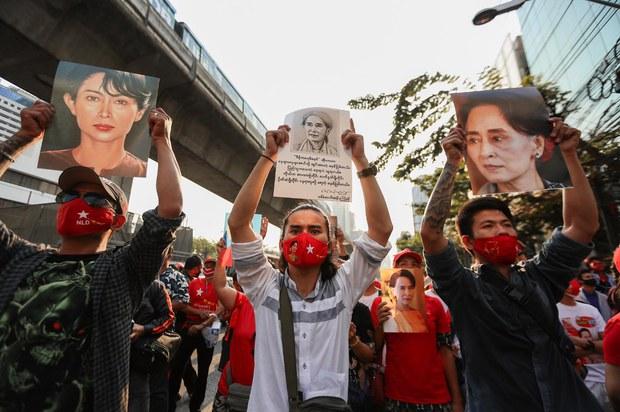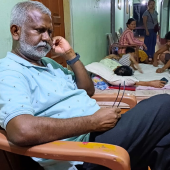Response from Southeast Asian neighbors to Myanmar coup seen as wanting

Countries in Southeast Asia gave a tepid response to a coup in Myanmar on Monday, with no nation coming forward to condemn the military’s seizure of power, amid a general erosion of democracy in the region.
Thailand, which shares a border with Myanmar and has its own history of military coups that toppled democratically elected governments, had little to say in response.
“It’s their own business, it’s their internal affair,” Thai Deputy Prime Minister Prawit Wongsuwan told reporters in Bangkok.
Prawit has had a lead role in the Thai government since a 2014 coup overthrew the elected administration of Yingluck Shinawatra.
In the Philippines, a spokesman for President Rodrigo Duterte offered a similar response about the coup in Myanmar.
“This is an internal matter,” spokesman Harry Roque said, preferring to discuss the more than 1,200 Filipino expatriates in Myanmar.
“The primary concern is the focus is the safety of Filipinos … we can offer repatriation and temporary shelter in the embassy,” Roque told reporters.
Opposition leaders in the Philippines say that Duterte has increased the power of the military and police since taking office in 2016.
Both the Philippines and Thailand are founding members of the 10-state Association of Southeast Asian Nations (ASEAN), which includes Myanmar. The bloc’s core principles include a policy of non-interference in the domestic affairs of member states.
The sultanate of Brunei, which chairs ASEAN this year, noted that its Charter calls for “adherence to the principles of democracy, the rule of law and good governance, respect for and protection of human rights and fundamental freedoms,” in a statement on the coup on behalf of the bloc.
Early on Monday, Myanmar’s military arrested Aung San Suu Kyi and other senior leaders, then declared a one-year state of emergency to deal with allegations of voting fraud tied to the general election in November, Radio Free Asia reported.
Suu Kyi’s National League for Democracy party won 396 seats in parliament while the army-affiliated Union Solidarity and Development Party won 33.
Internet and telecommunications services in the capital city were shut down in the capital city, Naypyidaw, RFA reported.
“In order to execute the necessary actions including the re-examination of voter’s lists ... all legislative, administrative and judiciary powers have been transferred to the military commander-in-chief,” said a statement issued by Interim President Myint Swe.
Malaysian and Indonesian leaders expressed concerns about the military action.
“Malaysia calls on the Myanmar military and all relevant parties to give utmost priority to the maintenance of peace and security in Myanmar, uphold the rule of law, and resolve any electoral discrepancies through established legal mechanisms and dialogue in a peaceful manner,” the foreign ministry said in a statement.
“Malaysia reaffirms the strong support for Myanmar’s democratic transition, peace process and inclusive economic development.”
Malaysia currently has an unelected government, after the previous administration collapsed in February 2020, and is under its first national emergency in more than five decades to tackle rising coronavirus infections.
In neighboring Indonesia, the Foreign Ministry said it was “deeply concerned” by the latest developments in Myanmar, and called for election disputes to be resolved through available legal mechanisms.
“Indonesia calls for the implementation of the principles contained in the ASEAN Charter, including the commitment to the rule of law, good governance, democratic principles and a constitutional government,” the statement said.
Indonesia is the largest democracy in Southeast Asia, but a Brookings Institute report in late January claimed that “there is now scholarly consensus that Indonesia’s democracy has not just stagnated but is regressing.”
The report said President Joko “Jokowi” Widodo had presided over a period of increasing military involvement in public life, with figures linked to the dictatorship of former President Suharto now back in politics. - BenarNews
Radio Veritas Asia (RVA), a media platform of the Catholic Church, aims to share Christ. RVA started in 1969 as a continental Catholic radio station to serve Asian countries in their respective local language, thus earning the tag “the Voice of Asian Christianity.” Responding to the emerging context, RVA embraced media platforms to connect with the global Asian audience via its 21 language websites and various social media platforms.














